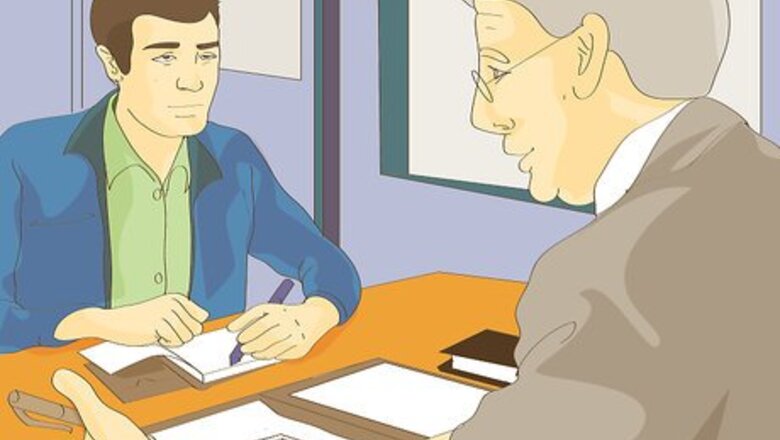
views
Requesting an Itemized Bill

Ask about itemized bills during your consultation. Before hiring an attorney, you should schedule a consultation. At the consultation, you can ask a variety of questions, including about fees. You should ask whether the lawyer will provide you with an itemized bill and whether it will increase your costs.

Make sure the lawyer agrees to provide itemized bills. If the lawyer agrees, then check your engagement letter or fee agreement. Be sure that this agreement states that the lawyer will provide you with itemized bills. If the engagement letter doesn’t state that, then don’t sign. Instead, call up the lawyer and ask that they include that condition in the engagement letter. If the lawyer won’t provide a written fee agreement, then you should look elsewhere for a lawyer.

Ask for an itemized bill. You might already have hired a lawyer. In this situation, you can certainly ask the lawyer to provide you with an itemized bill for all work that has been performed. The lawyer should get it to you within 10 days. An itemized bill should also contain a description of the work performed.
Reviewing Your Bill
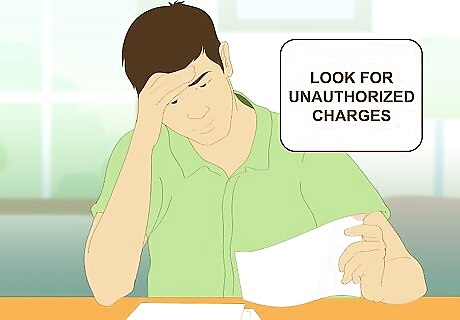
Look for unauthorized charges. You should compare the charges to what you authorized in the engagement letter. For example, the engagement letter probably gave the lawyer permission to charge you for photocopying and filing fees to file court documents. If you see those expenses listed on your bill, then you should realize you agreed to pay them. However, you shouldn’t be billed for secretarial time or for the use of librarians unless you agreed to these fees in your fee agreement. Your hourly rate also shouldn’t increase without your authorization. Make a note if it has. If you find any charges you never agreed to, then you should highlight them. Also write down any questions you have about a charge.
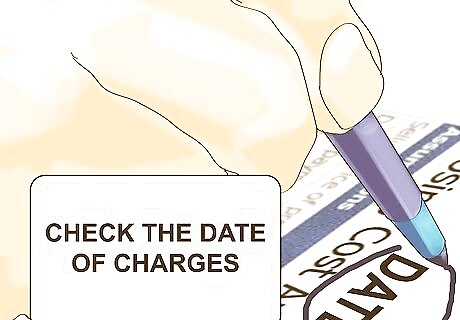
Check the date of charges. Each itemized entry should have a date for when the service was provided. If no date has been listed, then you should make a note of the expense. You can ask for more detail.

Find inappropriate charges. Some charges are inappropriate, even if you agreed to them in the fee agreement/engagement letter. Go through and look for any fee amount that seems unreasonable or excessively high. For example, your lawyer might have charged you $50 for photocopying. Check to see how many pages you had copied. If you think a charge seems high, then make a note. You can question the lawyer about the charge. You can also double check to see if filing fees were billed accurately. You can check the court’s website to find out how much it costs to file a document with the court.
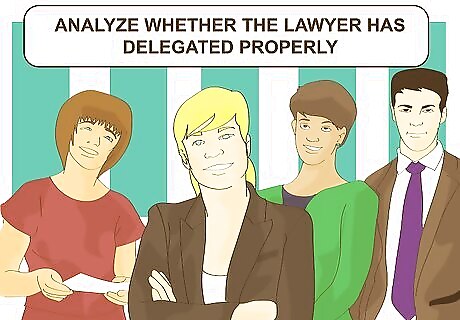
Analyze whether the lawyer has delegated properly. Many lawyers work as solo practitioners. This means that they are the only lawyer in the office. However, if your lawyer works in a larger law firm, then there probably are several junior associates who can be given low-level tasks to do. You should analyze your bill to see if work is being done by the appropriate people. Junior associates should do routine work like reviewing documents, creating files, and working with paralegals and clerks. If you see a senior attorney billing for these things, then you should be prepared to raise this issue. You also shouldn’t see any time billed for training junior attorneys. All training should be done on the law firm’s own expense.
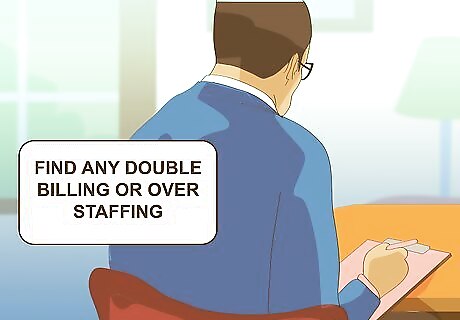
Find any double billing or over staffing. In larger law firms, a group of associates might be thrown at your case. Sometimes they can duplicate each other’s work. You should read the description for each itemized entry and see if more than one person is doing the same task. Some projects might also be overstaffed. Each itemized entry should have the identity of a specific employee (called the “timekeeper”). See how many people are working on your case. If you are going through a simple divorce, for example, then there shouldn’t be three or four associates assigned to the case.

Double check the calculation. Lawyers typically bill in six minute increments. This means they charge one-tenth of their hourly rate for each six minutes they work on your case. Double check to make sure the amount you are charged is accurate. For example, the lawyer might charge $300 an hour. If they performed a half hour of work, then you should be charged $150. Also make sure that costs, such as photocopying, are totaled correctly.
Disputing Your Bill

Talk to your lawyer. You should raise any disputes immediately. Don’t wait until your case has ended to start questioning your bills. Your lawyer might have made a good faith mistake and accidentally billed you for something. In this situation, raising the issue earlier will save everyone a lot of trouble. Call your lawyer up. You may have to speak to a secretary. Have the itemized bill in front of you and ask why you were charged for certain costs.

Decide if you want to pursue the issue further. You have options if the lawyer won’t reduce your bill. However, you should consider whether or not it is worth your time to dispute the bill any further than a phone call. For example, consider the following: The amount in dispute. Do you think the lawyer should cut $100 from a $5,000 bill? This might not be worth your time. In fact, mediation or arbitration can cost much more than a few hundred dollars. Whether you want to work with the lawyer again. You might have had a great relationship. In this situation, you might decide not to pursue the fee dispute. Whether you really authorized the expense. For example, someone in your company might have authorized that expensive expert witness you didn’t use at trial. If the lawyer committed malpractice or an ethical violation. You will have stronger leverage in a fee dispute if the lawyer was incompetent or if they breached ethical obligations, such as the obligation to maintain your confidences. A lawyer doesn’t commit malpractice simply because you lose a case. However, if they were truly terrible—such as failing to show up to court, or showing up completely unprepared—then you might want to pursue the fee dispute.

Propose mediation. Read your fee agreement and see if you agreed to a method of dispute resolution. Some agreements state that you will agree to mediate any dispute around fees. Even if the fee agreement is silent, you could still propose mediation. In mediation, you and the lawyer will meet with a third party neutral. This neutral is the “mediator,” and they help each side listen to each other. The mediator isn’t a judge, and they don’t decide which side is right. Instead, they try to help each side reach a resolution they can live with. Mediation is voluntary, and either side can walk away at any time. If you are interested in mediation, then contact the local bar association, which often has mediation programs you can use.

Consider arbitration. Arbitration is like a trial, though it is private. You and the attorney present your case to an arbitrator, who acts like a judge. Many bar associations provide arbitration for fee disputes. You might want to propose arbitration if mediation is unsuccessful. If you think your attorney committed malpractice, then you might not want to use the arbitration service. It might prevent you from suing later on your malpractice claim. You prepare for arbitration much as you would for a trial. You can introduce witness testimony or documents as evidence. You can also ask the lawyer’s witnesses questions. With a fee dispute, the main focus will be on the billing records and your fee agreement. See Dispute Attorney's Fees for more information.

Wait to be sued. You might not want to pay the lawyer. In this situation, you can skip mediation and arbitration and just refuse to pay. In this situation, you will wait to be sued. If you are thinking about pursuing this approach, then you should get advice from a different lawyer, since lawsuits are complicated and you want to understand the consequences of not paying. For example, the lawyer might get an “attorney’s lien” if you refuse to pay. This is a claim against your property, including any amount you win in your case. If you win a $100,000 lawsuit judgment, then the lawyer could assert their attorney’s lien and collect from that judgment. Attorney’s liens are generally contractual in nature, so read your fee agreement to see if it mentions this lien. Review the factors discussed above. A lawsuit takes more time, and costs more money, than either mediation or arbitration. You should only run the risk of being sued if you think you have a very strong case and if the amount in dispute is sufficiently large.

















Comments
0 comment